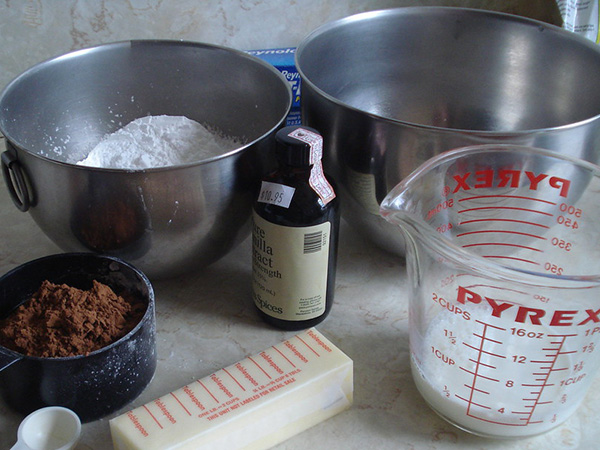Mastering Precision: Tips for Measuring Ingredients When Cooking
|
Sep 10, 2025 - By the dedicated team of editors and writers at Newsletter Station.

|
Cooking is often considered an art form where creativity and intuition play crucial roles. However, precision in measuring ingredients is the foundation for successful dishes. Whether you're a seasoned chef or a novice cook, mastering the art of accurate measurements can elevate your culinary creations to new heights.
Here are some essential tips to ensure your measurements are spot on every time you step into the kitchen.
-
Invest in Quality Measuring Tools
Having reliable measuring tools is essential for accurate cooking. Invest in quality measuring cups and spoons from durable materials like stainless steel or plastic. Additionally, consider purchasing a digital kitchen scale for measuring ingredients by weight, especially for baking, where precision is critical.
-
Follow the Recipe
Recipes are like roadmaps—they guide you through the cooking process, ensuring you reach your culinary destination successfully. Carefully read the recipe before you begin, and pay close attention to the specified measurements. Even a tiny deviation can significantly impact the outcome.
-
Use the Correct Measuring Technique
When measuring dry ingredients like flour, sugar, or spices, spoon them into the measuring cup or spoon and level off with a straight edge for accuracy. Avoid tapping or packing the ingredients, which can lead to inaccurate measurements. For liquids, place the measuring cup on a flat surface and bend down to check the level at eye level for precise measurement.
-
Convert Measurements Accurately
You are encountering a recipe with measurements in a unit different from what you're accustomed to, which can be daunting. Familiarize yourself with standard unit conversions or use online tools to ensure accuracy when converting between volume and weight measurements.
-
Account for Ingredient Consistency
Not all ingredients have the same consistency, even when measured by weight. For instance, a cup of loosely packed brown sugar will weigh differently from a cup of tightly packed brown sugar. Understanding ingredient consistency and adjusting your measurements can prevent dish discrepancies.
-
Practice Patience
Rushing through the measuring process can lead to inaccuracies. Take your time to measure each ingredient carefully, ensuring precision in every step of the cooking process. Remember, patience can go a long way in achieving culinary perfection.
-
Keep Your Tools Clean
Residual ingredients left on measuring tools can throw off your measurements. Clean your measuring cups and spoons thoroughly, and scale them between uses to prevent cross-contamination and ensure accurate measurements every time.
-
Double-Check Your Measurements
Before adding ingredients to your dish, double-check your measurements to ensure accuracy and avoid mistakes. Once an incorrect ingredient is added, it's challenging to correct the error without affecting the outcome of your dish.
-
Practice, Practice, Practice
Like any skill, mastering the art of measuring ingredients takes practice. Don't be discouraged by occasional mistakes—learn from them and use them as opportunities to improve your cooking skills.
-
Trust Your Instincts (Sometimes)
While precise measurements are crucial for specific recipes, don't be afraid to trust your instincts and adjust seasoning or ingredients to suit your taste preferences. Cooking is ultimately about creativity and enjoyment, so don't hesitate to experiment once you've mastered the basics.
In conclusion, mastering the art of measuring ingredients is essential for achieving consistent and delicious kitchen results. Investing in quality tools, following recipes meticulously, and practicing precision can elevate your cooking to new heights and impress even the most discerning palates.
Unlock the Power of Email Marketing
Harness the potential of email marketing with Newsletter Station. Reach your target audience, drive conversions, and achieve your business goals.
|
More Blogs
| Sep 24, 2025 |
Mindful Cooking: 7 Tips to Reduce Food Waste in the Kitchen
|
| Sep 17, 2025 |
Elevate Your Cooking: The Best Seasonings to Add to Your Recipes
|
| Sep 10, 2025 |
Mastering Precision: Tips for Measuring Ingredients When Cooking
|
| Sep 3, 2025 |
Mastering the Basics: Knife Skills 101
|
| Aug 27, 2025 |
Exploring Delicious Alternatives to Cooking with Butter
|
| Aug 20, 2025 |
Hosting a Potluck Party: Dos and Don'ts
|
| Aug 13, 2025 |
The Surprising Benefits of Mindful Eating: Nourishing the Body and Mind
|
| Aug 6, 2025 |
The Ultimate Guide to Hosting a Successful Brunch
|
| Jul 30, 2025 |
Unveiling the Secret to Perfect Chocolate Chip Cookies: A Baker's Guide
|
| Jul 23, 2025 |
Elevate Your Dining Experience: The Best Food and Wine Pairings
|
| Jul 16, 2025 |
Tips for Handling Raw Meat to Prevent Contamination
|
| Jul 9, 2025 |
Food You Shouldn't Reheat in the Microwave
|
|
|